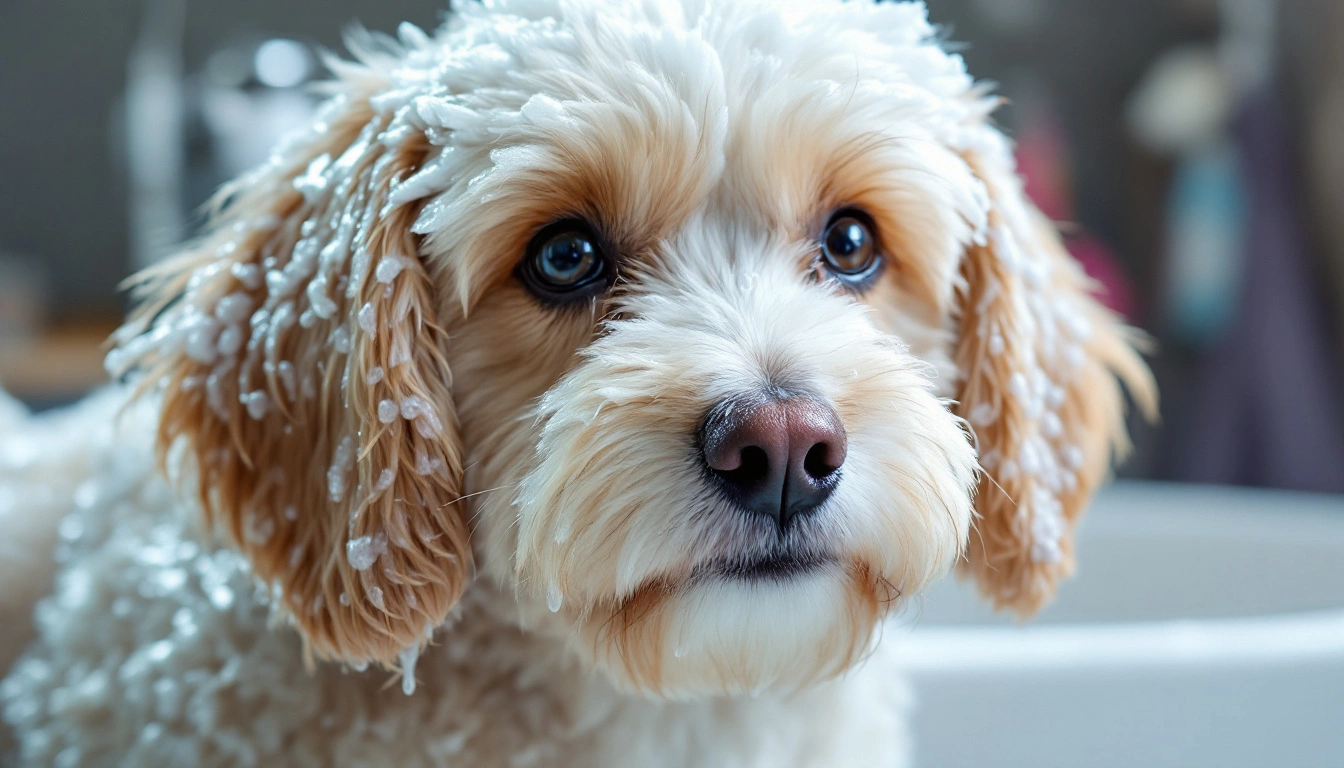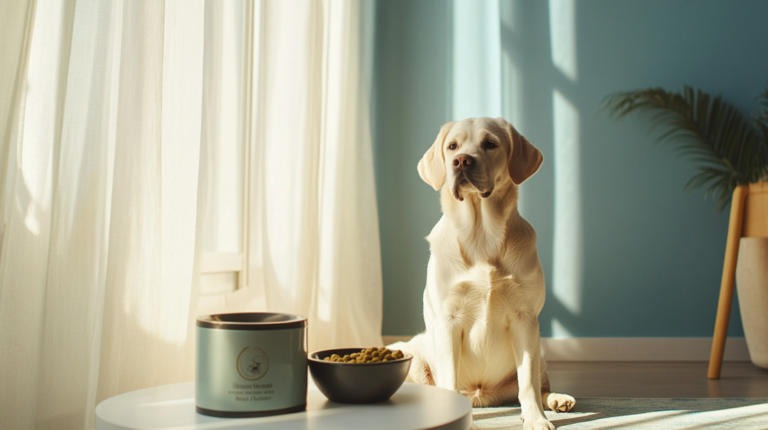Discover the 8 best dog shampoos for healthy skin and fur, featuring expert recommendations for different coat types and skin conditions. Find the perfect match for your furry friend!
Keeping your furry friend clean and healthy involves more than just the occasional bath. The right dog shampoo can make a significant difference in your pet’s skin health, coat shine, and overall well-being. With countless options flooding the market, finding the perfect dog shampoo that addresses your canine companion’s specific needs can feel overwhelming. Whether you’re dealing with dry, itchy skin, allergies, or simply want to maintain that fresh-smelling coat between grooming appointments, selecting the appropriate dog shampoo is essential for proper pet care.
In this comprehensive guide, we’ll explore the eight best dog shampoos designed to promote healthy skin and lustrous fur. We’ll dive into what makes each formula special, which skin and coat conditions they address, and how to choose the perfect match for your four-legged family member. From sensitive skin solutions to medicated formulas, hypoallergenic options to natural ingredients, we’ve researched and compiled everything you need to know about keeping your dog’s coat in top condition.
Table of Contents
Why Your Choice of Dog Shampoo Matters
Before we dive into our recommendations, it’s important to understand why using a specialized dog shampoo—rather than human products—is crucial for your pet’s health.
The Science Behind Dog Skin
Dogs have a different skin pH balance than humans. While human skin typically has a pH between 5.5 and 5.6, dogs have a more neutral pH ranging from 6.2 to 7.4. This fundamental difference means that human shampoos, which are formulated for our more acidic skin, can disrupt your dog’s skin barrier when used regularly.
The canine skin barrier, often called the “acid mantle,” protects against bacteria, viruses, and environmental contaminants. When this barrier is compromised by inappropriate shampoos, it can lead to dryness, irritation, and increased vulnerability to skin infections.
Common Skin Issues in Dogs
Dogs are prone to various skin conditions that the right shampoo can help manage:
- Allergic dermatitis: Environmental or food allergies that manifest as skin irritation
- Hot spots: Painful, inflamed areas that can develop rapidly
- Seborrhea: Condition causing scaly, flaky skin and excessive oil
- Fungal and bacterial infections: Including yeast infections and pyoderma
- Parasitic infestations: Such as fleas, ticks, and mites
According to veterinary dermatology studies, approximately 20% of dogs suffer from some form of skin condition during their lifetime, making proper coat care an essential aspect of pet health maintenance.
Key Ingredients to Look For in Dog Shampoos
The effectiveness of a dog shampoo largely depends on its ingredient profile. Here are some beneficial components to seek out:
Moisturizing Agents
- Aloe vera: Soothes irritation and provides natural moisture
- Oatmeal: Relieves itching and helps retain skin moisture
- Glycerin: Draws water to the skin and helps maintain hydration
- Vitamin E: Antioxidant properties that promote skin healing
- Shea butter: Deep moisturization for extremely dry skin
Medicated Ingredients
- Chlorhexidine: Antimicrobial that fights bacterial infections
- Ketoconazole: Antifungal that addresses yeast problems
- Salicylic acid: Helps with scale removal and promotes cell turnover
- Benzoyl peroxide: Deep cleansing for oily skin conditions
- Sulfur and coal tar: Traditional ingredients for managing seborrhea
Natural Additives
- Essential oils (in appropriate dilutions): Lavender, chamomile, and tea tree (in small amounts) can provide therapeutic benefits
- Honey: Natural antibacterial and humectant properties
- Coconut oil: Deeply moisturizing with antimicrobial benefits
- Almond oil: Rich in fatty acids that nourish the skin and coat
8 Best Dog Shampoos for Healthy Skin and Fur
1. Earthbath Oatmeal & Aloe Pet Shampoo
Best for: General use and mild sensitivity Key ingredients: Colloidal oatmeal, aloe vera, vitamin E Benefits:
Earthbath’s formulation stands out for its gentle yet effective cleansing action. The colloidal oatmeal works to soothe irritated skin while providing natural relief from itching. Combined with aloe vera, this shampoo delivers substantial moisture without leaving residue that can attract dirt.
Veterinary dermatologists frequently recommend oatmeal-based shampoos as a first-line approach for dogs with minor skin irritations. The pH-balanced formula means it won’t disrupt your dog’s natural skin barrier, making it suitable for regular use.
What makes this shampoo particularly noteworthy is its soap-free composition, which cleans effectively without stripping natural oils from your dog’s coat. Many users report noticeable improvements in coat shine after just a few applications, with the effects lasting longer than with many competing products.
2. Veterinary Formula Clinical Care Antiparasitic & Antiseborrheic Medicated Dog Shampoo
Best for: Seborrhea, parasitic infections, and scaling Key ingredients: Coal tar, salicylic acid, micronized sulfur Benefits:
This veterinary-strength formula addresses multiple skin conditions simultaneously. The powerful combination of coal tar and salicylic acid works to reduce flaking and scaling associated with seborrheic dermatitis, while the antimicrobial properties help manage bacterial overgrowth.
Clinical studies have shown that medicated shampoos containing these active ingredients can significantly reduce symptoms in dogs with diagnosed seborrhea within 2-3 weeks of regular use. This formulation is particularly effective because it targets both the symptoms and underlying causes of many skin conditions.
For maximum effectiveness, the manufacturer recommends leaving this shampoo on for 5-10 minutes before rinsing, allowing the active ingredients to penetrate the skin properly. While the scent is medicinal rather than perfumed, the therapeutic benefits outweigh aesthetic considerations for dogs with serious skin issues.
3. 4-Legger Certified Organic Dog Shampoo
Best for: Dogs with chemical sensitivities and allergies Key ingredients: Organic coconut oil, organic olive oil, aloe vera, essential oils Benefits:
For eco-conscious pet owners, 4-Legger offers a truly natural alternative with its USDA certified organic formulation. Free from synthetic detergents, parabens, and sulfates, this shampoo relies on plant-based ingredients to clean and nourish your dog’s coat.
The concentrated formula requires only a small amount per bath, making the bottle last longer than many conventional options. Users consistently report that their dogs’ coats feel softer and look shinier after switching to this natural option.
One of the most compelling aspects of this shampoo is its transparency—the short ingredient list contains easily recognizable components, allowing owners to know exactly what they’re applying to their pets. This clarity is particularly valuable for dogs with known sensitivities or allergies to common chemical ingredients.
4. Vet’s Best Hypo-Allergenic Dog Shampoo
Best for: Extremely sensitive skin and allergies Key ingredients: Aloe vera, vitamin E, allantoin Benefits:
Veterinary formulated specifically for dogs with pronounced skin sensitivities, this fragrance-free shampoo minimizes the risk of allergic reactions while still providing thorough cleansing. The hypoallergenic formula is soap-free and doesn’t contain harsh detergents that might exacerbate irritation.
What separates this from other sensitive skin formulas is the inclusion of allantoin, a compound known for its keratolytic properties that help remove dead skin cells while promoting healthy cell regeneration. This makes it particularly effective for dogs recovering from skin irritations or those prone to excessive flaking.
The gentle nature of this shampoo makes it suitable for puppies and dogs with compromised skin barriers. Many veterinary dermatologists recommend it as part of a rotation protocol for dogs with chronic skin conditions, alternating with medicated shampoos to prevent irritation from overuse of stronger formulations.
5. Burt’s Bees for Dogs Natural Oatmeal Shampoo
Best for: Dry, itchy skin Key ingredients: Colloidal oatmeal, honey, beeswax Benefits:
Leveraging Burt’s Bees’ expertise in natural human skincare, this canine formulation brings the same gentle philosophy to dog grooming. The pH-balanced formula is specifically designed for dogs’ skin needs while incorporating natural ingredients known for their soothing properties.
The combination of colloidal oatmeal and honey creates a uniquely effective moisturizing action—the oatmeal provides immediate itch relief while the honey acts as a natural humectant, drawing moisture into the skin and helping to maintain hydration between baths.
Laboratory testing has shown this formula to be 99.7% natural, addressing the growing consumer demand for transparent, clean ingredients in pet care products. Despite its natural composition, users report excellent lathering and rinsing properties, often a challenge with natural formulations.
6. Zesty Paws Oatmeal Anti-Itch Dog Shampoo with Aloe Vera and Vitamin E
Best for: Allergic dermatitis and seasonal allergies Key ingredients: Colloidal oatmeal, aloe vera, vitamin E, chamomile Benefits:
This advanced formulation combines traditional soothing ingredients with added anti-inflammatory compounds to address the complex nature of allergic skin reactions. The addition of chamomile provides extra calming benefits for irritated skin.
What makes this shampoo particularly effective for allergy-prone dogs is its comprehensive approach—cleaning the coat of potential allergens while simultaneously addressing the inflammatory response that causes itching and discomfort. The vitamin E component also helps repair damage to the skin barrier that often occurs with chronic scratching.
Many veterinarians recommend this shampoo as part of a multimodal approach to managing seasonal allergies. When used weekly during high-allergy seasons, it can significantly reduce the need for systemic medications in some dogs with mild to moderate symptoms.
7. Moosh Natural Dog Shampoo
Best for: Deep cleansing and detoxification Key ingredients: Bentonite clay, organic argan oil, aloe vera, essential oils Benefits:
Moosh stands apart from other formulations with its unique inclusion of bentonite clay, which acts as a natural detoxifier, drawing impurities from the skin and coat. This makes it particularly effective for dogs who play outdoors frequently or those exposed to environmental pollutants.
The combination of bentonite clay with nourishing argan oil creates a dual-action effect—deep cleansing paired with intensive moisturization. This formulation also includes shea butter for added conditioning benefits, making it suitable for dogs with longer coats that require more intensive management.
Laboratory analysis shows this shampoo effectively removes environmental toxins while leaving beneficial natural oils intact. The preservation system uses natural ingredients rather than parabens or other synthetic preservatives, addressing concerns about chemical exposure in regular grooming routines.
8. Davis Benzoyl Peroxide Medicated Dog Shampoo
Best for: Severe seborrhea, demodectic mange, and deep skin infections Key ingredients: 2.5% benzoyl peroxide, vitamin E Benefits:
This veterinary-strength medicated shampoo represents the most powerful option on our list, appropriate for diagnosed skin conditions rather than routine maintenance. The benzoyl peroxide formulation works as a follicular flushing agent, penetrating deep into hair follicles to address problems at their source.
Clinical studies confirm benzoyl peroxide’s effectiveness in managing demodectic mange when used as part of a treatment protocol. Its keratolytic properties also make it highly effective for seborrheic conditions characterized by excessive oiliness and scaling.
While potent, this formulation includes moisturizing components to counteract the drying effects associated with benzoyl peroxide. For maximum benefit, veterinary dermatologists typically recommend a contact time of 5-10 minutes before thorough rinsing, followed by a moisturizing rinse or conditioner to prevent excessive dryness.
How to Choose the Right Dog Shampoo
Selecting the optimal shampoo depends on understanding your dog’s specific needs:
Assess Your Dog’s Skin and Coat Type
- Normal skin and coat: Can use general maintenance shampoos with balanced moisture
- Dry, flaky skin: Requires extra moisturizing formulations with ingredients like oatmeal and aloe
- Oily, greasy coat: Benefits from clarifying shampoos that remove excess sebum
- Sensitive skin: Needs hypoallergenic, fragrance-free formulations
- Double coats (like Huskies or Shepherds): Often do better with dilutable shampoos that rinse completely
Consider Your Dog’s Lifestyle and Environment
- Active outdoor dogs may need more frequent bathing with deeper cleaning formulas
- Urban pets can benefit from detoxifying ingredients that address environmental pollutants
- Swimming dogs need shampoos that address chlorine exposure or saltwater damage
Recognize Signs That Indicate the Need for Specialized Formulas
If your dog exhibits any of these symptoms, consider consulting your veterinarian before selecting a shampoo:
- Persistent scratching or biting at the skin
- Redness or inflammation
- Strong odor that returns quickly after bathing
- Hair loss or excessive shedding
- Visible parasites or evidence of their presence
- Greasy or excessively dry coat texture
Bathing Best Practices for Optimal Results
Even the finest shampoo won’t deliver optimal results without proper bathing techniques:
Preparation and Frequency
- Brush thoroughly before bathing to remove loose fur and tangles
- Most dogs require bathing every 4-6 weeks, though this varies by breed and activity level
- Over-bathing can strip natural oils and cause dryness, while under-bathing can lead to skin issues
Proper Technique
- Use lukewarm water – too hot can dry the skin, too cold is uncomfortable
- Dilute shampoo according to instructions – many professional formulas require dilution
- Start at the neck and work backward, leaving the head for last
- Massage thoroughly to stimulate circulation and ensure deep cleaning
- Respect contact time recommendations for medicated shampoos
- Rinse completely – residue can cause irritation and attract dirt
- Consider a conditioner for long-haired breeds or dry skin conditions
Post-Bath Care
- Towel dry thoroughly before using a dryer if necessary
- Use a dryer on low heat or allow to air dry in a warm environment
- Brush again when partially dry to prevent matting in longer coats
- Monitor for any adverse reactions for 24-48 hours after trying a new product
Common Dog Shampoo Myths Debunked
Myth #1: Human Shampoo Is Fine for Occasional Use
Fact: Even occasional use of human shampoo can disrupt your dog’s skin pH balance and strip natural oils. The cumulative effect can lead to chronic dryness and increased vulnerability to skin infections.
Myth #2: All Natural Shampoos Are Gentle
Fact: While many natural ingredients are indeed gentle, some essential oils and plant extracts can cause sensitivity reactions in certain dogs. Natural doesn’t automatically mean hypoallergenic.
Myth #3: More Lather Means Better Cleaning
Fact: Heavy lathering often indicates high detergent content, which can be harsh on a dog’s skin. Many quality professional shampoos produce moderate lather but clean effectively through properly balanced surfactants.
Myth #4: Puppies Can Use Any Mild Dog Shampoo
Fact: Puppies have even more delicate skin pH and oil balance than adult dogs. They require specifically formulated puppy shampoos until they’re at least 12 weeks old.
Myth #5: Medicated Shampoos Are Always Better for Skin Problems
Fact: Using medicated shampoos without an appropriate diagnosis can sometimes worsen skin conditions. Some medicated ingredients can be too harsh for mild issues and should only be used when specifically indicated.
Recommended Pet Products on Amazon
Dog Shampoo Essentials
- Safari Professional Nail Trimmer – Keep your dog’s nails trimmed to prevent dirt accumulation that can contribute to skin issues.
- Hertzko Self-Cleaning Slicker Brush – Regular brushing removes dead hair and distributes natural oils throughout the coat, enhancing shampoo effectiveness.
- Aquapaw Pet Bathing Tool – This combination sprayer and scrubber makes bathing easier and ensures thorough rinsing of shampoo.
- Snuggle Puppy Warm Plush Toy – Provides comfort during bath time for dogs with bathing anxiety, making the entire process less stressful.
Frequently Asked Questions About Dog Shampoo
How often should I bathe my dog?
The appropriate bathing frequency depends on several factors including breed, coat type, activity level, and skin condition. As a general guideline:
- Dogs with oily coats (like Basset Hounds): Every 2-4 weeks
- Dogs with medium coats (like Border Collies): Every 4-6 weeks
- Dogs with double coats (like Huskies): Every 6-8 weeks unless particularly dirty
Overwashing can strip natural oils and cause dryness, while insufficient bathing can lead to oil buildup and skin problems. Your veterinarian can recommend the optimal schedule for your specific dog.
Can I use dog shampoo on puppies?
Most regular dog shampoos are too harsh for puppies under 12 weeks old. Puppies have a more delicate skin barrier that’s still developing. Look specifically for products labeled “puppy-safe” or “for all life stages.” These formulations will have milder detergents and often feature tear-free properties to protect sensitive eyes.
How long should I leave shampoo on my dog before rinsing?
For regular maintenance shampoos, 2-3 minutes of contact time is generally sufficient to clean effectively without causing irritation. Medicated shampoos often require longer contact times, typically 5-10 minutes, to allow the active ingredients to penetrate properly. Always follow the specific instructions on the product label or your veterinarian’s recommendations.
My dog has black skin spots. Should I use a special shampoo?
Black skin spots (hyperpigmentation) are often normal variations in many dogs. However, if these dark patches are new, spreading, or accompanied by other symptoms like itching or scaling, they could indicate an underlying skin condition that needs veterinary attention. In such cases, your veterinarian might recommend a specific medicated shampoo.
For normal hyperpigmentation, standard shampoos appropriate for your dog’s general coat type are suitable.
Can certain shampoos help with shedding?
While no shampoo can completely prevent normal seasonal shedding, certain formulations can help manage excessive shedding:
- Deshedding shampoos often contain omega fatty acids that strengthen hair follicles
- Moisturizing formulas can reduce breakage of dry hair
- Regular use of appropriate conditioners improves coat health
The most effective approach combines the right shampoo with regular brushing using appropriate tools for your dog’s coat type.
Are oatmeal shampoos safe for all dogs?
Oatmeal shampoos are generally considered among the safest and most versatile options for dogs with normal to dry skin. However, in rare cases, dogs can be allergic to oat proteins. If you notice increased itching, redness, or discomfort after using an oatmeal-based product, discontinue use and consult your veterinarian.
Additionally, for dogs with yeast infections, oatmeal may not be ideal as its natural sugars can potentially feed the yeast organisms. In these cases, antifungal formulations would be more appropriate.
Expert Tips for Maximum Benefits from Dog Shampoos
Rotation Strategy for Optimal Skin Health
Many professional groomers and veterinary dermatologists recommend a rotation strategy rather than using the same shampoo for every bath. For example:
- Use a gentle, moisturizing shampoo for regular maintenance baths
- Incorporate a clarifying shampoo once every 3-4 baths to remove product buildup
- Consider seasonal adjustments—more moisturizing formulas in winter, lighter options in summer
Pre-Bath Oil Treatment for Extreme Dryness
For dogs with severely dry skin, consider applying a small amount of coconut oil or olive oil to the coat 20-30 minutes before bathing. The oil helps lift stuck scales and prepare the skin to better absorb the moisturizing components of the shampoo.
Spot-Treating Problem Areas
Not all skin issues affect the entire body equally. For localized problems:
- Apply medicated shampoo to affected areas first
- Allow longer contact time on problem spots
- Use gentler formulations on unaffected areas
Water Quality Considerations
Hard water can affect shampoo performance and coat health:
- Hard water minerals can leave residue that dulls the coat
- Consider a water softener attachment for your hose or shower
- Use a clarifying rinse with apple cider vinegar (1 tablespoon per gallon of water) after shampooing in hard water areas
Ready for a Healthier Coat? Explore More Pet Care Resources
For more expert pet care tips and product recommendations tailored to your dog’s specific needs, visit BlithePet. Our comprehensive guides cover everything from nutrition to grooming, training to health maintenance, all designed to help you provide the best possible care for your furry family member.
Whether you’re dealing with specific skin conditions or simply want to maintain your dog’s coat in peak condition, our veterinarian-reviewed resources can help you make informed decisions about your pet’s care routine.
Conclusion
Choosing the right dog shampoo is a crucial aspect of your pet’s overall health and comfort. Beyond just cleanliness, the appropriate formulation can help manage or prevent skin conditions, reduce irritation, and enhance your dog’s natural coat beauty. By understanding your dog’s specific needs and using products formulated with quality ingredients, you’re investing in their long-term well-being.
Remember that skin and coat conditions can sometimes indicate underlying health issues, so persistent problems warrant a veterinary consultation. With the right combination of quality products, proper bathing techniques, and regular maintenance, you can help ensure your canine companion enjoys healthy skin and a lustrous coat throughout their life.
We’d love to hear about your experiences with different dog shampoos! Share your success stories or challenges in the comments section below, and help fellow pet parents find solutions that work for their furry friends.







